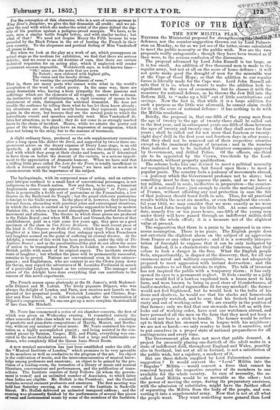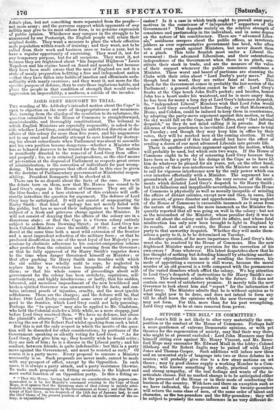TOPICS OF THE
THE NEW MILITIA PLAN. Nurruira the Ministerial proposal for strengthenintifts INAS' 021 defences, nor the counter-suggestion thrown out by Lord Palmer- ston on Monday, so far as we yet see of the latter, seems calculated to meet the public necessity or the public wish. Nor are the two proposals really antagonistic ; though they have been treated as if they were, to the serious confusion of the discussion..
The proposal advanced by Lord John Russell is too large, or it is too small. An addition of five thousand men is made to the regular army, but not at all on the score of home defence : it will not quite make good the draught of men for the miserable war at the Cape of Good Hope ; so that the addition to our regular forces is literally made for the Cape war. Lord John Russell ad- mits that it is so, when he wants to make the addition look in- significant in the eyes of economists ; but he classes it with the measures for national defence, as he throws the dew Bill into the Reform Bill, to " make up a bill" out of little contributions and savings. Now the fact is, that while it is a large addition for such a purpose as the little war aforesaid, he cannot claim credit for it on the score of national defence : it has nothing to do with the Militia resolution.
Briefly, the proposal is, that one-fifth of the young men from the age of twenty to the age of twenty-three shall be called out in the first year, and in subsequent years one-fifth of those between the ages of twenty and twenty-one ; that they shall serve for four years ; shall be called out for not more than fourteen or twenty- eight days' drill in the first year and fourteen days in after years ; that they shall not be removed out of their respective counties except on the imminent danger of invasion ; and in the number thus indicated are to be included Volunteer companies approved by Government, and drilled Police. Of the officers, one-third are to be appointed by the Crown, two-thirds by the Lord- Lieutenant, without property qualification. The scheme looks like one devised to meet a political necessity not recognized by its authors, but forced upon them ; to meet a popular panic. The country feels a jealousy of movements abroad, —a jealousy which the Government professes not to share ; but something must be done to appease the panic, and so we have a toy militia, small in scale, ineffective in preparation—the counter- feit of a national force ; just enough to excite the mutual jealousy of France, without affording any real protection in case the fire of that jealousy should burst forth in acts. Thus, for all practical results within the next six months, or even throughout the event- ful year 1852, we may consider that we were exactly as we were before Lord John brought in his little bill. At some subsequent date, namely five or ten years hence, one-fifth of the young men under thirty will have passed through an indifferent militia-drill —that is the whole effect; it is a measure not of the slightest value at present.
The supposition that there is a panic to be appeased is an erro- neous assumption. There is no panic. The English people does not entertain the slightest alarm on the subject of an aggression from France or any other quarter ; and it is a cowardly interpre- tation of foresight to suppose that it can be only instigated by fear. Indeed, it is a characteristic trait of the timorous, that they ' refuse to look a danger in the face. What the English people feels, unquestionably, is disgust at the discovery, that, for all our enormous naval and military expenditure, we are not adequately prepared to meet aggression with instant destruction; and the public resolves to set that mistake to rights. The talk of invasion has not inspired the public with a temporary alarm ; it has only opened its eyes to a permanent neglect. It feels exactly as a jolly farmer would feel if a lawless vagabond took a house next to his farm, and were known to bring in good store of blunderbusses, of lueifer-matches, and of ragamuffins fit for any mischief : the farmer would not feel frightened, but he would look to the bolts of his doors and shutters, he would see that his stacks and homesteads were properly watched, and be sure that his &dock had not got rusty and out of working order. We are exactly in the position of that farmer; only we find that our stewards have left us with fire- locks out of working order, have sent our watchmen abroad, and have persuaded all the men on the farm that they need not keep a look-out nor have a stick to handle. The farmer would be rather apt to think that his steward was in league with his neighbour: we are not so harsh—we only resolve to look to it ourselves, and to put ourselves in a proper state of national preparedness for all contingencies and every time.
The Government plan does not meet that public demand. A. project for presently placing one-fortieth of the adult males in a state of indifferent drill, throughout England and Wales, possibly also in Scotland, but not at all in Ireland, is not a satisfaction of the public wish, but a cajolery, a mockery of it. But are these defects supplied by Lord Palmerston's !saunter- suggestion P It would convert the " Local" Militia into the "Regular" Militia — would convert a force that cannot be removed beyond the respective counties of its members to one available for the whole country. In ease of necessity, the so- called Local Militia would be as moveable as the other ; but the power of moving the corps, during its preparatory exercises, with the admission of substitutes, might have the farther effect of separating the Militia from the body of the people, and con- verting it into a supplemental army. Now that is not at all what the people want. They want something more general than Lord
John's plan, but not something more separated from the people— not more army; and the perverse support which opponents of any militia may give to its most odious form, is no genuine expression of publio opinion. Whichever may conquer in the struggle to be announced by our Postscript, the English people will retain their original desire. They want a measure to place the whole effective male population within reach of training; and they want, not to be called from their work and business once or twice a year, but to have a regular opportunity of exercising. They want it, not for any temporary purpose, but for all occasions. They want it, not because they are frightened about " his Imperial Highness " Louis Napoleon and his regime based on fraud and murder, but because they have been made aware that the men of England are not in a state of manly preparation befitting a free and independent nation —that they have fallen into habits of inaction and effeminate unfa- miliarity with manly exercises; and they want it, not more for the specific purpose of defence, than to cure those inglorious habits, and place the people in that condition of strength that would render aggression an impossibility, a madness, a suicide of the invader.



























 Previous page
Previous page